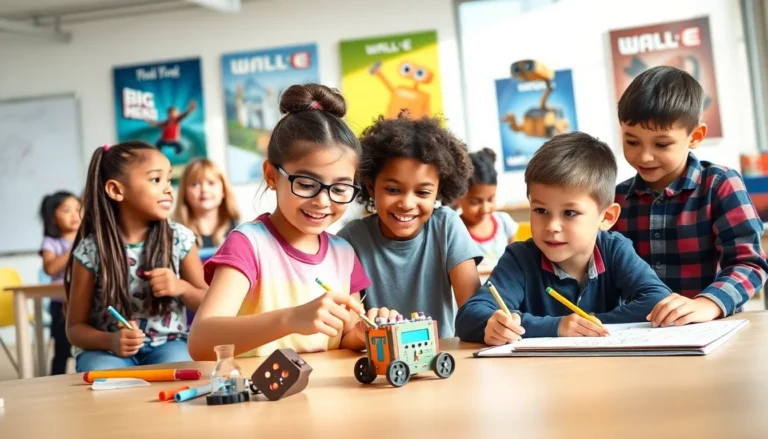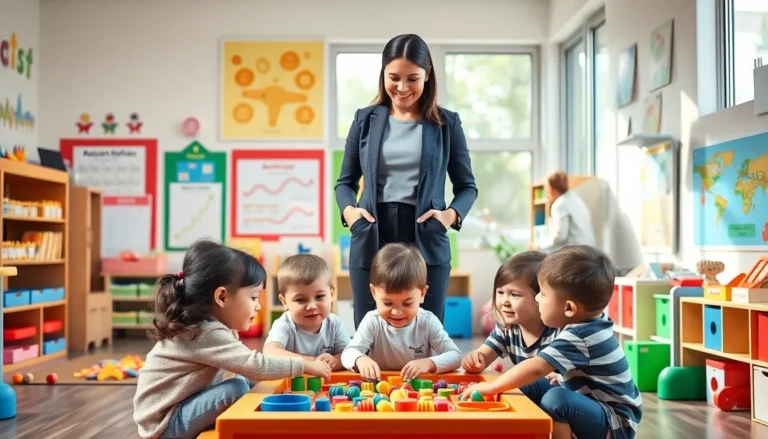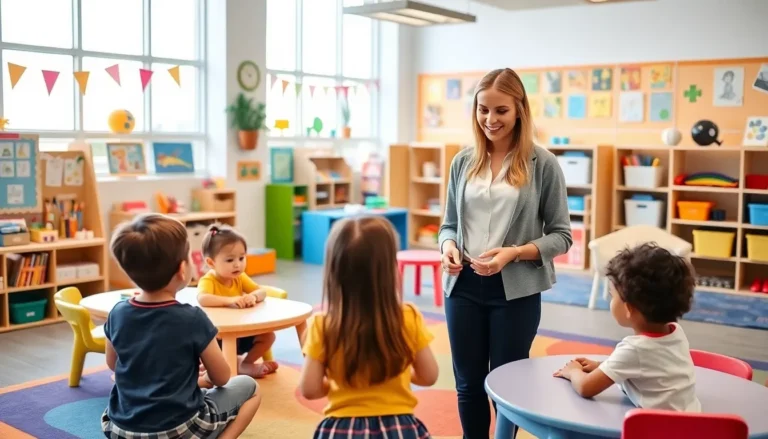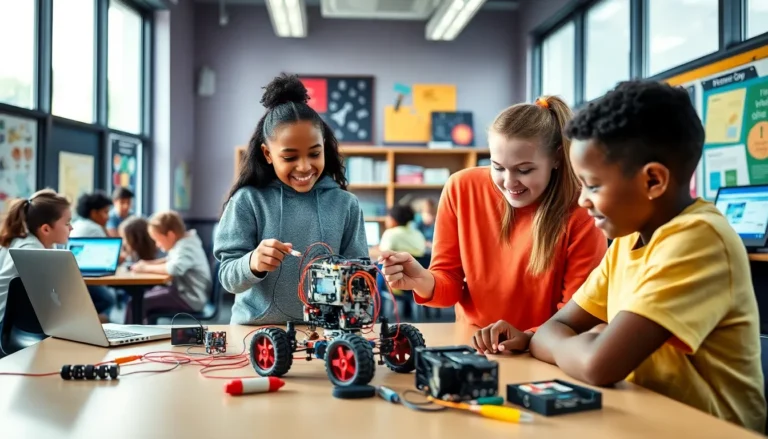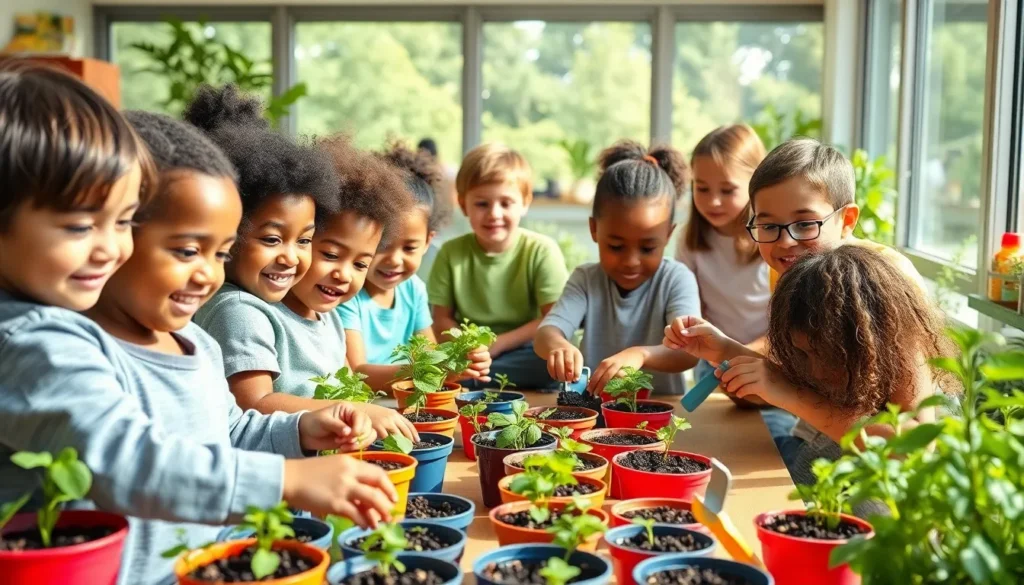Table of Contents
ToggleIn today’s rapidly changing world, nurturing a sense of environmental responsibility in young children is more important than ever. Preschool environmental education lays the foundation for sustainable habits and a deep appreciation for nature. By engaging in hands-on activities and outdoor exploration, children develop a connection to their surroundings that fosters curiosity and respect for the planet.
Integrating environmental education into preschool curriculums not only enhances children’s understanding of ecosystems but also promotes critical thinking and problem-solving skills. As they learn about recycling, conservation, and biodiversity, these little learners become empowered to make a difference. This early exposure to environmental concepts cultivates lifelong advocates for the Earth, ensuring a brighter future for generations to come.
Overview of Preschool Environmental Education
Preschool environmental education focuses on teaching young children about their surroundings and the importance of preserving nature. Programs prioritize hands-on learning activities, enabling children to interact directly with different ecosystems. Activities like planting seeds, observing wildlife, and exploring local parks encourage curiosity and foster a respectful attitude toward the environment.
Connecting children with nature enhances their understanding of ecological systems. They learn about plants, animals, and the interdependence of living organisms through play and exploration. This observational learning not only builds knowledge but also develops critical thinking and problem-solving skills, essential for understanding complex environmental issues.
Integrating environmental education into preschool curriculums offers numerous benefits. Children develop a sense of responsibility for their environment, cultivating early advocates for sustainability. Research indicates that early exposure to these concepts promotes lifelong environmental awareness and advocacy. By instilling these values from a young age, preschools contribute significantly to creating informed citizens who prioritize ecological health.
Importance of Early Environmental Awareness
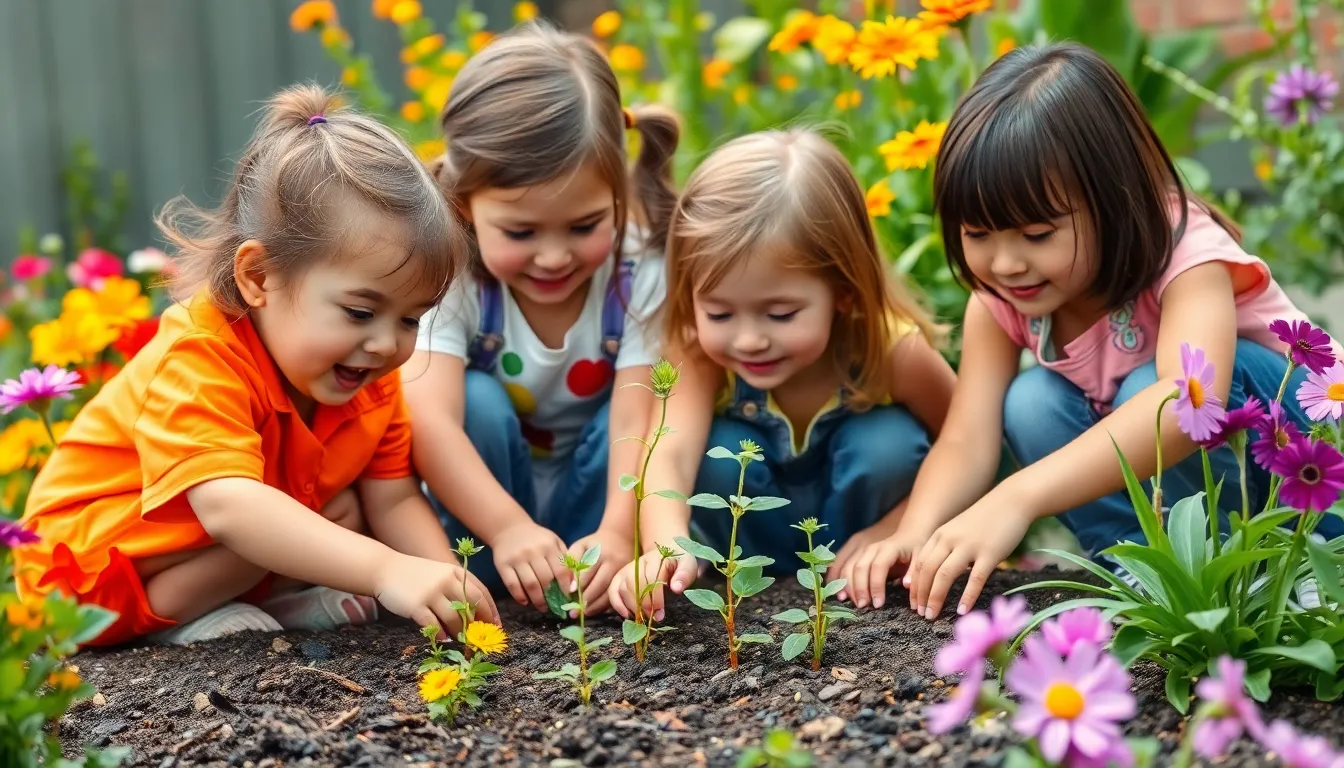
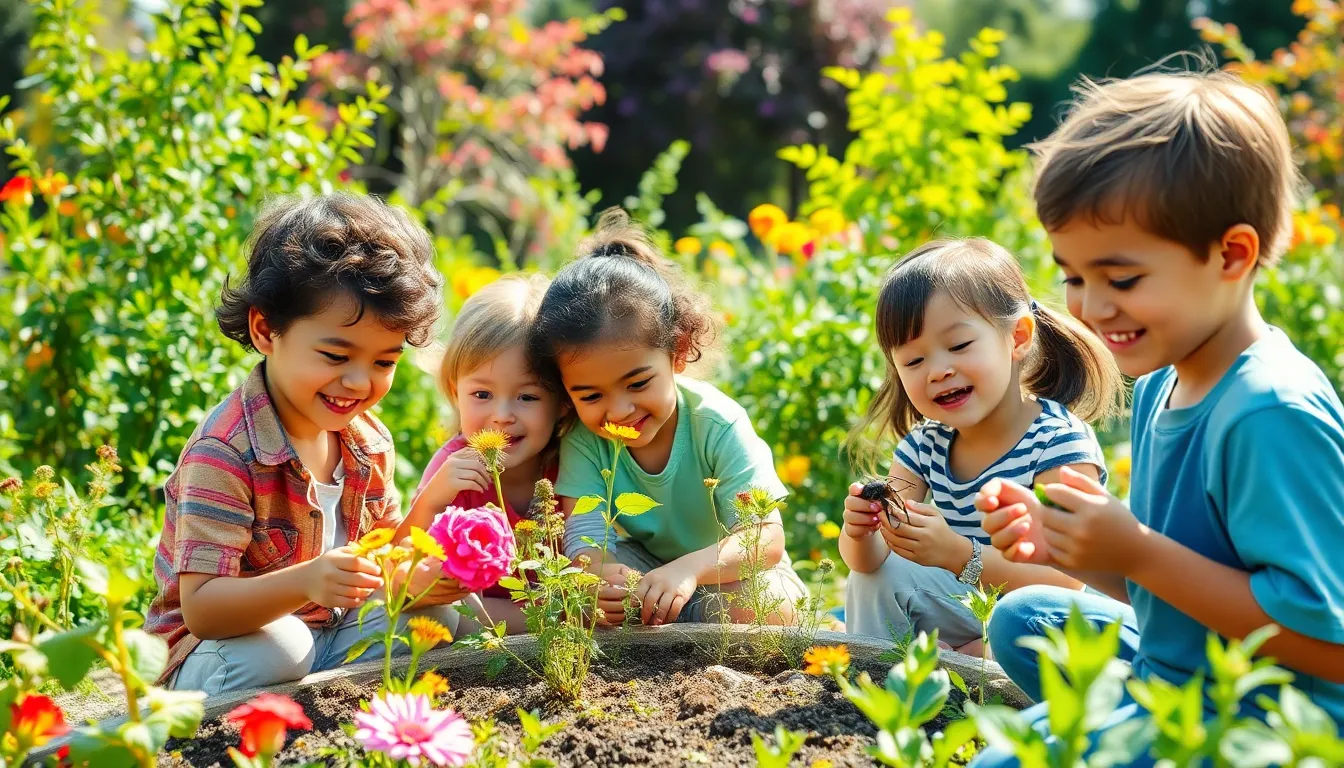
Early environmental awareness shapes children’s understanding of ecological responsibility. Engaging with nature in preschool fosters a connection that cultivates respect and care for the environment.
Developing Eco-Consciousness in Young Children
Engaging in hands-on activities like gardening or nature walks encourages eco-consciousness. Participation in these experiences helps children recognize the importance of biodiversity, conservation, and sustainability. Exploring local ecosystems introduces concepts like habitats and food chains, allowing children to see their place within the larger world. Observing the impacts of human actions on the environment reinforces the need for responsible behavior towards nature.
Benefits of Environmental Education in Preschool
Environmental education in preschool provides numerous benefits.
| Benefit | Description |
|---|---|
| Knowledge Acquisition | Children learn about ecosystems, plants, and animals through direct experience. |
| Critical Thinking Skills | Problem-solving activities help develop critical thinking related to environmental issues. |
| Social Responsibility | Collaborative projects foster a sense of community and shared responsibility for nature. |
| Enhanced Curiosity | Interactive learning stimulates curiosity about the natural world. |
| Lifelong Environmental Advocacy | Early exposure encourages children to become lifelong advocates for sustainability. |
Integrating these educational elements cultivates informed, responsible citizens who prioritize ecological health throughout their lives.
Effective Teaching Strategies
Teaching preschool environmental education effectively involves utilizing engaging strategies. These methods foster a deep connection between children and their environment while building essential skills.
Hands-On Learning Activities
Hands-on learning activities play a crucial role in preschool environmental education. Children gain firsthand experiences through interactive projects like:
- Gardening: Children plant flowers, vegetables, or herbs, learning about growth cycles and the importance of plants in ecosystems.
- Recycling Projects: Kids engage in simple recycling tasks, understanding the benefits of reusing materials and reducing waste.
- Nature Crafts: Constructing art from natural materials, such as leaves or twigs, encourages creativity while promoting an appreciation for nature.
These activities actively involve children, enhancing their understanding of environmental concepts while nurturing curiosity and responsibility.
Nature-Based Experiences
Nature-based experiences provide opportunities for meaningful explorations outdoors. Teachers can implement strategies such as:
- Nature Walks: Guided walks allow children to observe local plants and wildlife, teaching them about various ecosystems and their inhabitants.
- Wildlife Observation: Setting up bird feeders or insect hotels creates a living lab, where children can witness daily interactions within ecosystems.
- Seasonal Exploration: Engaging with nature throughout the changing seasons helps children recognize the cyclical patterns of life and their impact on the environment.
These experiences develop a sense of wonder, fostering a lifelong connection to the natural world and an understanding of ecological balance.
Integrating Environmental Education into the Curriculum
Integrating environmental education into preschool curriculums promotes comprehensive learning experiences. Teachers can embed eco-friendly themes across various subjects, reinforcing key concepts through diverse approaches.
Hands-on Activities
Hands-on activities engage children while enhancing their understanding of environmental concepts. Examples include:
- Gardening projects: Children learn about plant growth, ecosystem interactions, and the importance of sustainability by planting seeds and caring for gardens.
- Recycling initiatives: Children participate in recycling stations, sorting materials and understanding the impact of waste on the environment.
- Nature crafts: Craft projects using natural materials teach children to appreciate resources while fostering creativity.
Outdoor Exploration
Outdoor exploration connects children to their surroundings. Key activities include:
- Guided nature walks: Children observe local flora and fauna, reinforcing their understanding of ecosystems and habitats.
- Wildlife observation: Direct interaction with animals encourages curiosity about biodiversity and conservation.
- Seasonal explorations: Children learn about changing ecosystems throughout the year, solidifying their awareness of environmental cycles.
Collaborative Learning
Collaborative projects foster teamwork and enhance social responsibility. Examples include:
- Group outdoor clean-ups: Children work together to clean local parks, instilling a sense of community responsibility towards environmental stewardship.
- Eco-friendly art installations: Collaborative art projects using recycled materials raise awareness of sustainability issues.
- Story-sharing sessions: Sharing stories about nature encourages reflection and collective problem-solving about environmental challenges.
Critical Thinking and Problem Solving
Emphasizing critical thinking through environmental themes develops essential skills. Opportunities include:
- Problem-based learning: Children tackle real-world environmental issues, such as waste reduction and water conservation, fostering innovative solutions.
- Inquiry-based activities: By asking questions about their environment, children develop analytical skills and engage in research-based learning.
- Discussion forums: Class discussions about environmental responsibility deepen understanding and encourage advocacy.
Conclusion
Integrating environmental education through hands-on experiences, outdoor activities, collaborative learning, and critical thinking reinforces children’s connection to nature. This well-rounded approach cultivates eco-consciousness, preparing young learners for future challenges and responsibilities regarding environmental stewardship.
Challenges in Implementing Preschool Environmental Education
Implementing preschool environmental education poses various challenges that educators and institutions face. Addressing these challenges is crucial for effective learning outcomes.
- Resource Availability
Limited access to materials and resources can hinder hands-on experiences. Many preschools lack funding for eco-friendly supplies, outdoor equipment, and educational tools.
- Curriculum Integration
Difficulty integrating environmental education into existing curriculums exists. Educators often struggle to include eco-themes in subjects like math, science, and language arts without additional training or support.
- Teacher Training
Insufficient training for educators affects their confidence in delivering environmental content. Many teachers lack knowledge about environmental topics and sustainable practices, impacting lesson effectiveness.
- Parental Involvement
Varying levels of parental engagement present a challenge. Some parents may not prioritize environmental education, limiting the reinforcement of eco-consciousness at home.
- Time Constraints
Time limitations within the school day restrict opportunities for outdoor exploration and experiential learning. Educators often feel pressured to cover extensive curriculums, sidelining environmental activities.
- Standardized Testing
Pressure from standardized testing can lead to a narrow focus on core subjects. Environmental education may receive inadequate attention, pushing essential eco-based learning to the periphery.
- Cultural Differences
Diverse cultural backgrounds influence how environmental issues are perceived. Educators must navigate varying beliefs and practices, ensuring that lessons resonate universally without alienating families.
- Infrastructure Limitations
Lack of access to suitable outdoor spaces can impede nature-based activities. Urban preschools may face challenges in providing children with authentic experiences related to nature and ecosystems.
- Community Support
Building a supportive community network can be challenging. Partnerships with local organizations and environmental groups may be underdeveloped, limiting resource sharing and collaborative initiatives.
Overcoming these challenges requires proactive strategies and collaboration among educators, parents, and communities to enrich preschool environmental education effectively.

